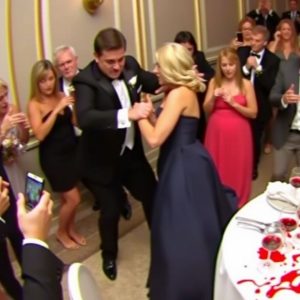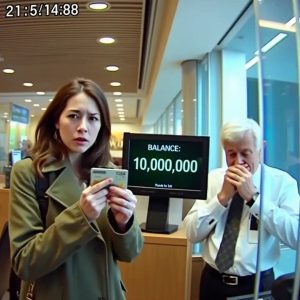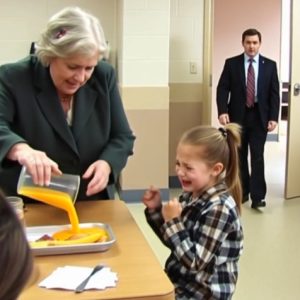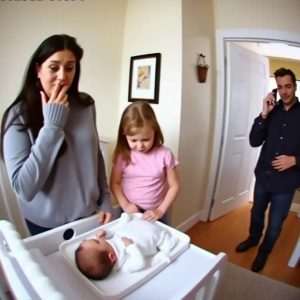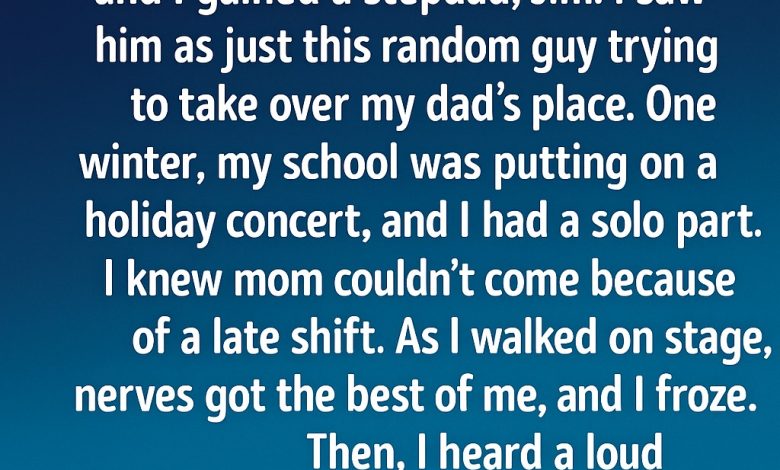
I was ten when my life quietly shifted in a way I didn’t yet have words for. My parents had divorced a few years earlier, and while I’d settled into life with my mom, I still carried a quiet resistance to the idea of anyone stepping into my dad’s place.
Then came Jim.
He wasn’t a father figure to me—just a man who suddenly lived in our house, sat at our dinner table, and tried a little too hard to win me over. I kept my distance. Answered his questions with one-word replies. Rolled my eyes at his jokes. No matter how kind he was, I refused to let him in. He wasn’t my dad, and I wasn’t going to pretend.
That winter, my school announced a holiday concert. It wasn’t grand—just the gym dressed up with paper snowflakes and a few strings of lights—but for a kid, it felt like Broadway. I’d been given a small solo. Just a few lines in the middle of a carol, but to me, it was everything. I practiced for weeks, humming under my breath, rehearsing in front of the mirror, whispering the words before bed.
The night of the concert, I was nervous but proud. My mom had promised to come, but her late shift ran long, and she called to say she couldn’t make it. I told her it was okay, but inside, I was crushed. I wanted her in the front row, clapping, smiling. Now, I felt alone.
The gym buzzed with excitement—parents packed the bleachers, siblings squirmed, and the scent of hot chocolate drifted from the concession stand. When my moment came, I stepped onto the stage and froze. My hands trembled. My mouth went dry. The words I’d practiced vanished.
Then, through the silence, a voice rang out:
“You’ve got this!”
I looked toward the crowd. There was Jim—standing, clapping, grinning like I was the star of the show. His face radiated belief in me, the kind I couldn’t find for myself.
Something shifted. The knot in my chest loosened. I took a breath, lifted my chin, and sang. My voice wasn’t perfect, but it was steady. By the end, I even smiled. Applause erupted, and for the first time that night, I felt proud.
After the concert, Jim was waiting in the hallway. In his hands was a paper cup of hot chocolate, steam curling into the cold December air. He didn’t say anything dramatic. Just handed it to me and said:
“I’m proud of you.”
That simple gesture landed like a revelation. Jim wasn’t trying to replace my dad or earn a title I wasn’t ready to give. He was just showing up—in the quiet, important places. Not with pressure, but with presence.
From that night on, something changed. I didn’t start calling him “Dad,” and he never asked me to. But I stopped keeping him at arm’s length. I let him drive me to practice. I told him about my day. We found small rituals—popcorn during movies, fixing things in the garage, laughing at the same bad jokes. He stopped being “the guy Mom married” and became something far more meaningful: someone who earned his place through patience, consistency, and kindness.
Now, looking back as an adult, I see how pivotal that concert was. It wasn’t about the song or the applause. It was about freezing on stage and realizing someone was there—cheering for me when I needed it most.
Family isn’t always about blood or names on a birth certificate. Sometimes it’s about who shows up, who believes in you, and who waits with hot chocolate in their hands when the spotlight fades.
That was the night Jim became my stepdad—not by marriage, but by love.
